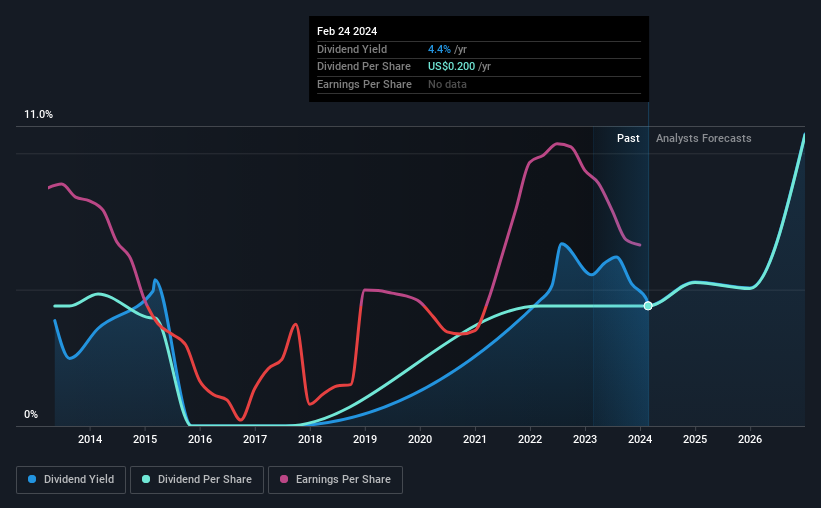Here's What We Like About Safe Bulkers' (NYSE:SB) Upcoming Dividend
Safe Bulkers, Inc. (NYSE:SB) is about to trade ex-dividend in the next 4 days. The ex-dividend date is one business day before a company's record date, which is the date on which the company determines which shareholders are entitled to receive a dividend. The ex-dividend date is important because any transaction on a stock needs to have been settled before the record date in order to be eligible for a dividend. Accordingly, Safe Bulkers investors that purchase the stock on or after the 29th of February will not receive the dividend, which will be paid on the 19th of March.
The company's next dividend payment will be US$0.05 per share, and in the last 12 months, the company paid a total of US$0.20 per share. Last year's total dividend payments show that Safe Bulkers has a trailing yield of 4.4% on the current share price of US$4.53. We love seeing companies pay a dividend, but it's also important to be sure that laying the golden eggs isn't going to kill our golden goose! That's why we should always check whether the dividend payments appear sustainable, and if the company is growing.
Check out our latest analysis for Safe Bulkers
Dividends are typically paid out of company income, so if a company pays out more than it earned, its dividend is usually at a higher risk of being cut. Safe Bulkers paid out a comfortable 33% of its profit last year.
Click here to see the company's payout ratio, plus analyst estimates of its future dividends.
Have Earnings And Dividends Been Growing?
Companies with consistently growing earnings per share generally make the best dividend stocks, as they usually find it easier to grow dividends per share. Investors love dividends, so if earnings fall and the dividend is reduced, expect a stock to be sold off heavily at the same time. That's why it's comforting to see Safe Bulkers's earnings have been skyrocketing, up 31% per annum for the past five years. Safe Bulkers is paying out less than half its earnings and cash flow, while simultaneously growing earnings per share at a rapid clip. This is a very favourable combination that can often lead to the dividend multiplying over the long term, if earnings grow and the company pays out a higher percentage of its earnings.
The main way most investors will assess a company's dividend prospects is by checking the historical rate of dividend growth. Safe Bulkers's dividend payments are broadly unchanged compared to where they were 10 years ago.
The Bottom Line
Should investors buy Safe Bulkers for the upcoming dividend? Companies like Safe Bulkers that are growing rapidly and paying out a low fraction of earnings, are usually reinvesting heavily in their business. This is one of the most attractive investment combinations under this analysis, as it can create substantial value for investors over the long run. In summary, Safe Bulkers appears to have some promise as a dividend stock, and we'd suggest taking a closer look at it.
On that note, you'll want to research what risks Safe Bulkers is facing. Our analysis shows 3 warning signs for Safe Bulkers and you should be aware of these before buying any shares.
If you're in the market for strong dividend payers, we recommend checking our selection of top dividend stocks.
Have feedback on this article? Concerned about the content? Get in touch with us directly. Alternatively, email editorial-team (at) simplywallst.com.
This article by Simply Wall St is general in nature. We provide commentary based on historical data and analyst forecasts only using an unbiased methodology and our articles are not intended to be financial advice. It does not constitute a recommendation to buy or sell any stock, and does not take account of your objectives, or your financial situation. We aim to bring you long-term focused analysis driven by fundamental data. Note that our analysis may not factor in the latest price-sensitive company announcements or qualitative material. Simply Wall St has no position in any stocks mentioned.

